 资源简介
资源简介
(共21张PPT)
Unit5
Languages Around the World
Reading for writing
新人教版必修一
Free Talk
What’s your biggest problem with learning English
remembering vocabulary
...
listening
reading comprehension
learning grammar
pronunciation
writing ability
What do you usually do when you meet these problems
Wang Le posted a post (发帖) on an online forum.
What is an online forum
An online forum is an Internet-based place where people exchange ideas and opinions about one problem.
Read these posts from an online forum for Chinese students who are learning English and fill in the table on page 67.
Reading for information
An online forum is an Internet-based place where people exchange ideas and opinions about one problem.
What is an online forum
1.Who starts this blog
2.Who respond to it
3. What is the blog mainly about
Some problems and advice in English learning.
Wang Le.
Liu Wen, Jia Xin and Li Rui.
Reading for information
Blog
comment
Fill in the table.
Name Problem Advice
Liu Wen Jia Xin's advice
Jia Xin Li Rui's advice
Li Rui Your advice
trouble with listening to native English speakers
how to be
polite in
English
remembering
new
vocabulary
listen to English radio programmes, repeat what you hear, record your voice and compare your pronounciation with the radio host's
Use short requests for close friends.
Use longer requests people not so close. Use more polite phrases for people senior to you.
Create your own word bank: carry a small notebook with you everywhere, and add new words when you learn them, learn word chunks instead of single word, learn word formation, sort out your vocabulary based on topics.
Fast-reading
What’s the topic of the blog
Who starts the blog
Who respond to it
Hi! I've been studying English since primary school. I used to get high marks in English, but now I'm having a lot of trouble with my listening. When I listen to native English speakers talking in a video, I can catch only a few words. I can never quite get the main idea. Any advice
1.Read and find out what are their problems.
Problem
2.Find supporting details of these problems.
Supporting details
Reading
Supporting details are usually examples or facts that are used to describe or explain the topic sentence. They can make your description or explanation more vivid(生动的)and convincing(令人信服的,有说服力的).
Listening to English radio programmers helps me get used to how fast native speakers talk. I also repeat what I hear to help myself to experience the feeling of the language. Sometimes I even record my voice so I can listen to myself and compare my pronunciation with the radio host's! My biggest headache is how to be polite in English. It's so much easier to just say "Open the window!", but in English that can sound really terrible. I have to think about who I'm talking to and then decide whether to say, "Open the window, please!" or "Could you open the window, please " or even longer "Would you mind opening the window, please "
Supporting details
Problem
Yeah, that's really hard! I think it all depends on who you're talking to. If I'm talking to a close friend, I can use short requests, like “Open the window”—our relationship is close and we're equals, so I only need a few words to bridge the gap between us. But if I'm talking to someone who isn't very close to me, I must make my request longer—and I must make it a question, not a demand, e.g., "Could you open the window, please " If I'm talking to someone senior to me, then I should say, "Would you mind opening the window, please " For me, vocabulary is my biggest problem—there are just SO MANY new words! I can't keep all the new vocabulary straight in my head, and I certainly can't remember how to use them all properly. HELP!
Supporting details
Problem
What are inculded in a blog or online forum
original post
post starter
楼主
comment
replies to a post
Learning English
Wang Le
Liu Wen
Jia Xin
Li Rui
start the topic
reply to Wang Le
reply to Liu Wen
reply to Jia Xin
Reading for main idea
post starter 楼主
Hi! I’ve been studying English since primary school. I used to get high marks in English, but now I’m having a lot of trouble with my listening. When I listen to native English speakers talking in a video, I can catch only a few words. I can never quite get the main idea. Any advice
Liu Wen
Name Problem
Liu Wen
Listening to English radio programmes helps me get used to how fast native speakers talk. I also repeat what I hear to help myself to experience the feeling of the language. Sometimes I even record my voice so I can listen to myself and compare my pronunciation with the radio host’s! My biggest headache is how to be polite in English. It’s so much easier to just say “Open the window!”, but in English that can sound really terrible. I have to think about who I'm talking to and then decide whether to say, “Open the window, please!” or “Could you open the window, please ” or even longer “Would you mind opening the window, please ”
Jia Xin
Name Problem Advice
Liu Wen
Jia Xin
listening to native English speakers
Jia Xin's advice
listen to English radio programmes
repeat what you hear, record your voice
how to be polite in English
Never fear problems.
Never stop challenging yourself.
Learn words & expressions
Task: Match the words with its definition.(定义)
repeat
pronunciation
equal
gap
demand
vocabulary
words and expressions
require something in a strong way
how words sound
big difference between things
say something again or do something again
identical(等同)
Learn words & expressions
Task: Match the words with its definition.(定义)
proper
description
relate
explain
revise
make something clear
polish and make your writing better
right; appropriate
connect
make something clear by writing or speaking
Yeah, that’s really hard! I think it all depends on who you’re talking to. If I’m talking to a close friend, I can use short requests, like “Open the window”– our relationship is close and we’re equals, so I only need a few words to bridge the gap between us. But if I’m talking to someone who isn’t very close to me, I must make my request longer—and I must make it a question, not a demand, e.g., “Could you open the window, please ” If I’m talking to someone senior to me, then I should say, “Would you mind opening the window, please ” For me, vocabulary is my biggest problem—there are just SO MANY new words! I can’t keep all the new vocabulary straight in my head, and I certainly can’t remember how to use them all properly. HELP!
Li Rui
Name Problem Advice
Jia Xin how to be polite in English use short requests for close friends
use longer requests for people who are not so close
use more polite phrases for people senior to you
Li Rui
remembering new vocabulary
Your advice
Li Rui's advice
carry a small notebook with you everywhere, and add new words when you learn them, learn word chunks instead of single word, learn word formation.
Step 1 Think of a problem you have in learning English.
Step 2 Describe the prolems with details.
Step 3 Write some ideas on how to solve the problem.
Step 4 Connect the problem and advice together by using those sentence structures.
Example: I have trouble with phrasal verbs
Example: There are so many of them and it seem impossible to work out the measings just from the word.
Example: 1. use flashcards
2. make sentences that are true to life
Writing--how to write a blog
possible version:
I have trouble with phrasal verbs. There are so many of them an it seems impossible to work out the meanings just from the words.And some of the verbs have different meanings. For example, "put off" can mean postpone, discourage (someone from doing something), and make someone dislike (something). I try to use phrasal verbs sometimes, but I usually use the wrong one!
My classmates had some suggestions for me. One is to use flash cards on which I write down the phrasal verb and a sentence with it.In this way, I can study them when I have time. Another suggestion is to use the phrasal verb in a sentence that is true for me so that it's easier to remember.
I'm trying them now. I hope they will work for me.
assessment
展开更多......
收起↑
 资源预览
资源预览

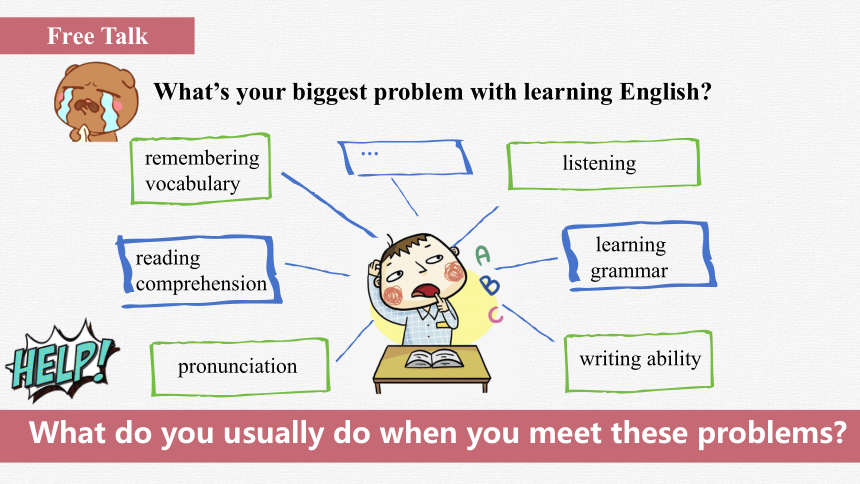


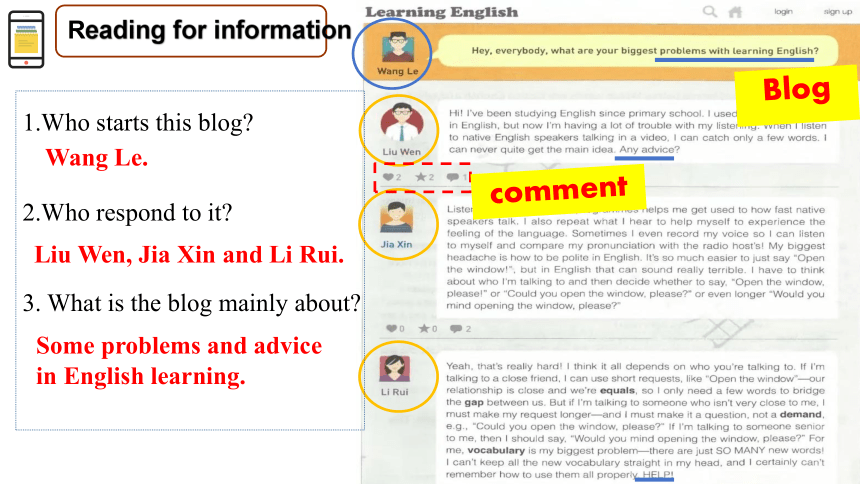
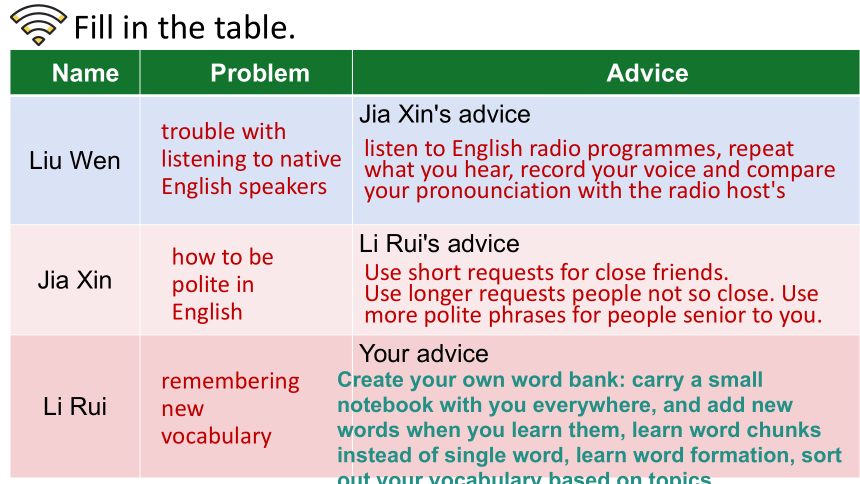
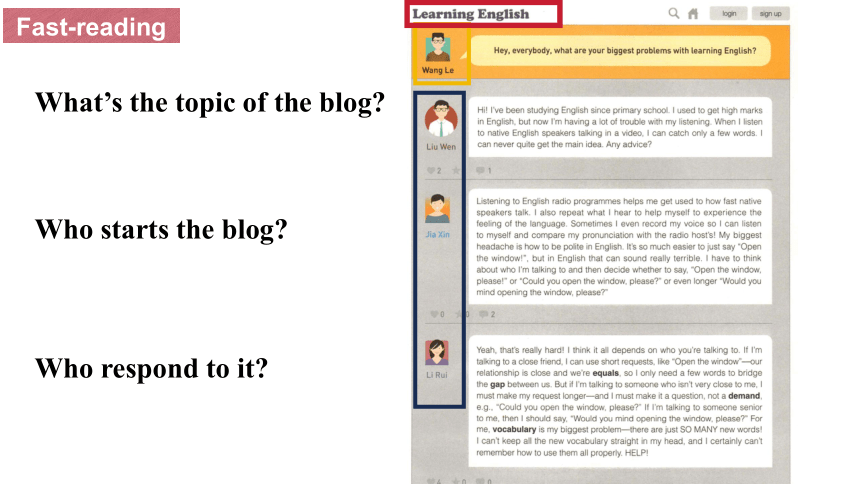
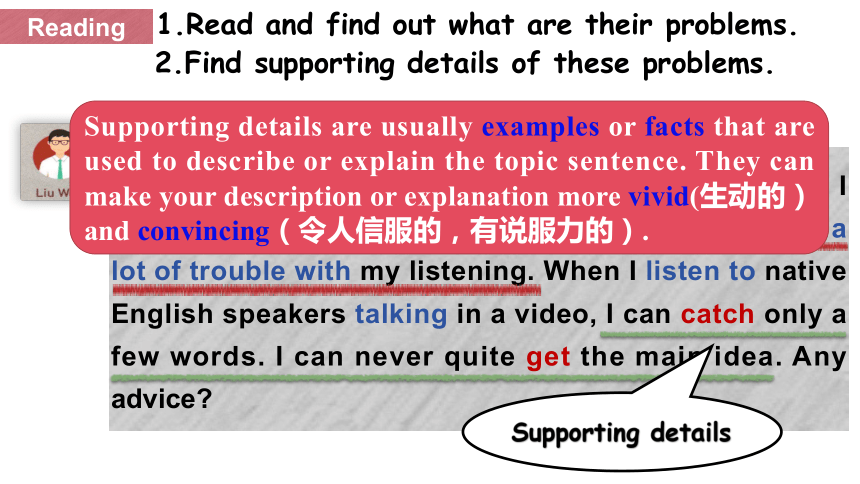
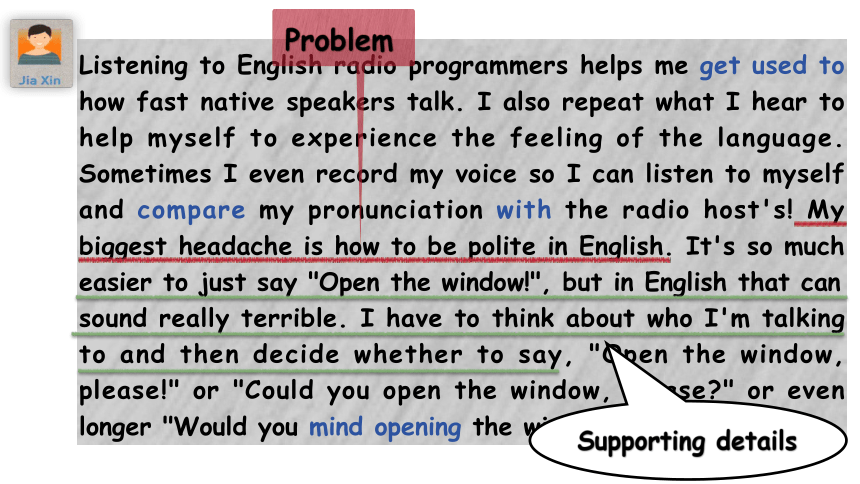
 资源预览
资源预览








